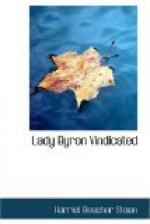* * * * *
Such is the story of Lord Byron’s mistress,—a story which is going the length of this American continent, and rousing up new sympathy with the poet, and doing its best to bring the youth of America once more under the power of that brilliant, seductive genius, from which it was hoped they had escaped. Already we are seeing it revamped in magazine-articles, which take up the slanders of the paramour and enlarge on them, and wax eloquent in denunciation of the marble-hearted insensible wife.
All this while, it does not appear to occur to the thousands of unreflecting readers that they are listening merely to the story of Lord Byron’s mistress, and of Lord Byron; and that, even by their own showing, their heaviest accusation against Lady Byron is that she has not spoken at all. Her story has never been told.
For many years after the rupture between Lord Byron and his wife, that poet’s personality, fate, and happiness had an interest for the whole civilized world, which, we will venture to say, was unparalleled. It is within the writer’s recollection, how, in the obscure mountain-town where she spent her early days, Lord Byron’s separation from his wife was, for a season, the all-engrossing topic.
She remembers hearing her father recount at the breakfast-table the facts as they were given in the public papers, together with his own suppositions and theories of the causes.
Lord Byron’s ‘Fare thee well,’ addressed to Lady Byron, was set to music, and sung with tears by young school-girls, even in this distant America.
Madame de Stael said of this appeal, that she was sure it would have drawn her at once to his heart and his arms; she could have forgiven everything: and so said all the young ladies all over the world, not only in England but in France and Germany, wherever Byron’s poetry appeared in translation.
Lady Byron’s obdurate cold-heartedness in refusing even to listen to his prayers, or to have any intercourse with him which might lead to reconciliation, was the one point conceded on all sides.
The stricter moralists defended her; but gentler hearts throughout all the world regarded her as a marble-hearted monster of correctness and morality, a personification of the law unmitigated by the gospel.
Literature in its highest walks busied itself with Lady Byron. Hogg, in the character of the Ettrick Shepherd, devotes several eloquent passages to expatiating on the conjugal fidelity of a poor Highland shepherd’s wife, who, by patience and prayer and forgiveness, succeeds in reclaiming her drunken husband, and making a good man of him; and then points his moral by contrasting with this touching picture the cold-hearted pharisaical correctness of Lady Byron.
Moore, in his ‘Life of Lord Byron,’ when beginning the recital of the series of disgraceful amours which formed the staple of his life in Venice, has this passage:—




